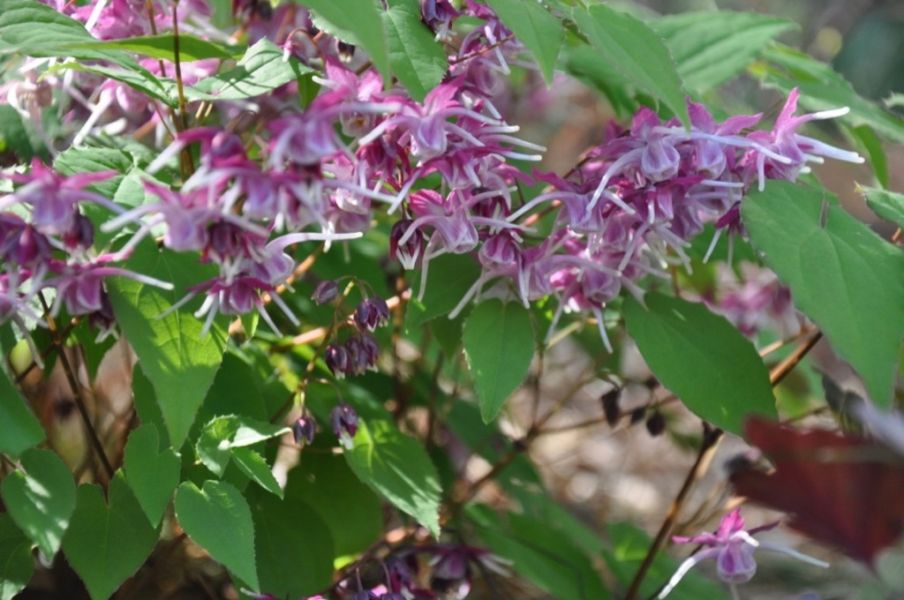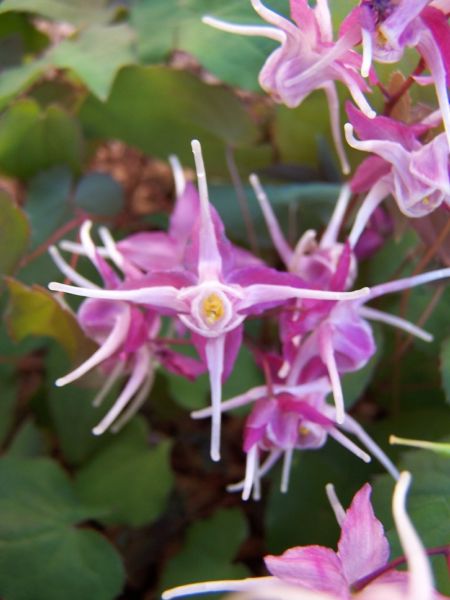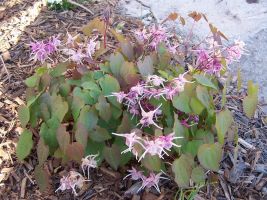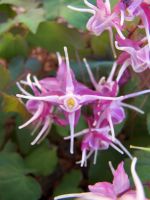Epimedium Purple Pixie
Clump forming, but vigorous.
I’m happy to bring you a new fantastic epimedium selection, brought to us from the garden of Dr. Richard Lighty, former Director of Mt. Cuba Center for the study of Piedmont Flora. This selection was found in a huge clump of Epimedium grandiflorum ‘Alba’ has been growing in Dr. Lighty’s former garden for over 15 years and the clump never escaped it’s current location, but it made a large clump rather quickly. I’ve been growing Purple Pixie in my garden for the past 10 years and I must say, it is truly one of my favorite harbingers of spring. This is a true, but strong clumper with very handsome foliage. The foliage is tight and dense with rhubarb red spring markings. The blooms, although delicate in appearance are a strong 1 1/2 inches of violet-purple with protruding pure white spurs. The plant grows 9-12 inches tall and 12-15 inches wide in three years. It never needs water and had never had any winter foliar damage i the 10 years I’ve grown it in both Baltimore, MD and Chicago, IL. Purple Pixie also propagates fairly easily and a rapidly from root cuttings and divisions. Small divisions of this selection also fill a container quickly and make a much more attractive, salable plant. What makes this plant different from other barrenworts? Well first,the violet-purple sepals are the most vivid color of any purple blooming selection on the market and second, the clump, although not very large when fully grown, grows to a mature size in the first two to three years, so you don’t have to wait forever for it to bulk up - nor is it an aggressive ground cover like some other selections. Purple Pixie also propagates fairly easily and a rapidly from root cuttings and divisions. Small divisions of this selection also fill a container quickly and make a much more attractive, salable plant. This selection was found in a huge part of a clump of Epimedium grandiflorum ‘Alba’ has been growing in Dr. Lighty’s former garden for over 15 years and the clump never escaped it’s current location, but like I said above, it made a large clump rather quickly. We have bare root 3-4 eye divisions (about 500) coming from a grower in The Netherlands who has been bulking these up for the past few years. I am working with The Conard-Pyle Co. on this project since they are the patent owner. Royalties are paid on a per sold basis ad the rate is $.18 per plant sold. We have a program in place that makes it easier to produce epimediums for less. In the future clumps with 10-30 divisions each will be available. This is a cheaper alternative to purchasing a single division. These clumps have ben successfully divided by a few growers and planted directly into 32 cells, quarts and 1 gallon containers (depending on how much you chop up the clump). This is still a two growing season crop, no matter how you do it, but if we can keep the cost of divisions down by selling clumps, we are very interested in saving our licensed growers money in order to get the numbers of epimediums sold to increase.
Who Am I?
-
Common Name:Purple Pixie barren wort
-
Botanical Name:Epimedium 'Purple Pixie' PP13966
-
Type:Perennial
-
Evergreen:YES
Cultural Details
TYPE
EVERGREEN
-
Light:Part to full shade
-
Soil:Average garden soil, but can tolerate poor soils.
-
Moisture:moist to dry, but well drained
-
Hardiness Zone4 – 8
-
Bloom Time:Late mid to late April.
-
Bloom Color:Purple and white
-
Size:9-12” tall by 15-24” wide in 3 years
-
Diseases & Pests:None known.





